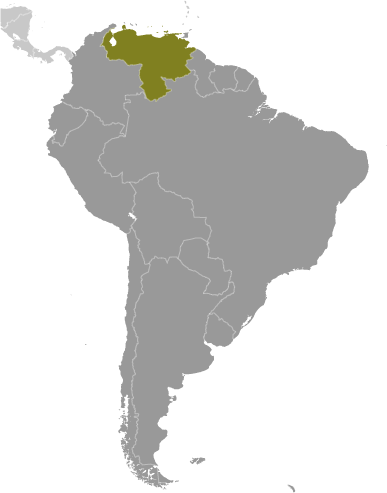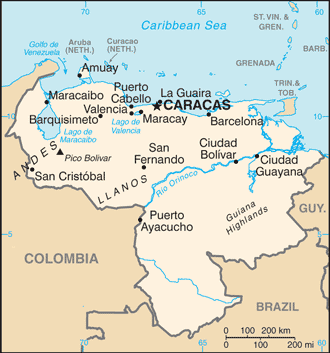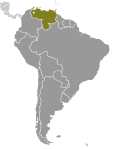
|
|
Advertisements:
EconomyEconomy - overview
Venezuela remains highly dependent on oil revenues, which account for roughly 95% of export earnings, about 40% of federal budget revenues, and around 12% of GDP. Fueled by high oil prices, record government spending helped to boost GDP growth by 4.2% in 2011, after a sharp drop in oil prices caused an economic contraction in 2009-10. Government spending, minimum wage hikes, and improved access to domestic credit created an increase in consumption which combined with supply problems to cause higher inflation - roughly 28% in 2011. President Hugo CHAVEZ's efforts to increase the government's control of the economy by nationalizing firms in the agribusiness, financial, construction, oil, and steel sectors have hurt the private investment environment, reduced productive capacity, and slowed non-petroleum exports. In the first half of 2010 Venezuela faced the prospect of lengthy nationwide blackouts when its main hydroelectric power plant - which provides more than 35% of the country's electricity - nearly shut down. In May 2010, CHAVEZ closed the unofficial foreign exchange market - the "parallel market" - in an effort to stem inflation and slow the currency's depreciation. In June 2010, the government created the "Transaction System for Foreign Currency Denominated Securities" to replace the "parallel" market. In December 2010, CHAVEZ eliminated the dual exchange rate system and unified the exchange rate at 4.3 bolivars per dollar. In January 2011, CHAVEZ announced the second devaluation of the bolivar within twelve months. In December 2010, the National Assembly passed a package of five organic laws designed to complete the transformation of the Venezuelan economy in line with CHAVEZ's vision of 21st century socialism. In 2011, Venezuela continued to wrestle with a housing crisis, higher inflation, an electricity crisis, and rolling food and goods shortages - all of which were fallout from the government's unorthodox economic policies. The budget deficit reached around 5.2% of GDP in 2011, and public debt as a percent of GDP climbed steeply, despite record oil prices. Gdp (purchasing power parity) World Ranking: 35
$378.9 billion (2011 est.)
$363.7 billion (2010 est.) $369.2 billion (2009 est.) Note Data are in 2011 US dollars Gdp (official exchange rate)
$315.8 billion (2011 est.)
Gdp - real growth rate World Ranking: 92
4.2% (2011 est.)
-1.5% (2010 est.) -3.2% (2009 est.) Gdp - per capita (ppp) World Ranking: 96
$12,700 (2011 est.)
$12,500 (2010 est.) $12,900 (2009 est.) Note Data are in 2011 US dollars Gdp - composition by sector
Agriculture 3.8%
Industry 35.8% Services 60.4% (2011 est.) Labor force World Ranking: 41
13.32 million (2011 est.)
Labor force - by occupation
Agriculture 7.3%
Industry 21.8% Services 70.9% (4th quarter, 2011 est.) Unemployment rate World Ranking: 98
8.2% (2011 est.)
8.5% (2010 est.) Population below poverty line
27.4% (2011 est.)
Household income or consumption by percentage share
Lowest 10% 1.7%
Highest 10% 32.7% (2006) Distribution of family income - gini index World Ranking: 67
39 (2011)
49.5 (1998) Investment (gross fixed) World Ranking: 121
17.6% of GDP (2011 est.)
Budget
Revenues $90.67 billion
Expenditures $106.1 billion (2011 est.) Taxes and other revenues World Ranking: 100
28.7% of GDP (2011 est.)
Budget surplus (+) or deficit (-) World Ranking: 156
-4.9% of GDP (2011 est.)
Public debt World Ranking: 100
34.9% of GDP (2011 est.)
18.6% of GDP (2010 est.) Note Data cover central government debt, as well as the debt of state-owned oil company PDVSA; the data include treasury debt held by foreign entities; the data include some debt issued by subnational entities, as well as intra-governmental debt; intra-governmental debt consists of treasury borrowings from surpluses in the social funds, such as for retirement, medical care, and unemployment; some debt instruments for the social funds are sold at public auctions. Inflation rate (consumer prices) World Ranking: 220
26.1% (2011 est.)
28.2% (2010 est.) Central bank discount rate World Ranking: 4
29.5% (31 December 2010)
29.5% (31 December 2009) Commercial bank prime lending rate World Ranking: 25
17.15% (31 December 2011 est.)
18.348% (31 December 2010 est.) Stock of narrow money World Ranking: 32
$110.8 billion (31 December 2011 est.) $117.8 billion (31 December 2010 est.) Stock of broad money World Ranking: 52
$115.8 billion (31 December 2011 est.) $124.2 billion (31 December 2010 est.) Stock of domestic credit World Ranking: 59
$72.45 billion (31 December 2011 est.) $87.96 billion (31 December 2010 est.) Market value of publicly traded shares World Ranking: 87
$5.143 billion (31 December 2011) $3.991 billion (31 December 2010) $8.86 billion (31 December 2009) Agriculture - products
Corn, sorghum, sugarcane, rice, bananas, vegetables, coffee; beef, pork, milk, eggs; fish Industries
Petroleum, construction materials, food processing, textiles; iron ore mining, steel, aluminum; motor vehicle assembly, chemical products, paper products Industrial production growth rate World Ranking: 89
3.4% (2011 est.)
Electricity - production World Ranking: 28
123.1 billion kWh (2011 est.)
Electricity - consumption World Ranking: 34
85.85 billion kWh (2011 est.)
Electricity - exports
633 million kWh (2009 est.)
Electricity - imports
373 million kWh (2009 est.)
Oil - production World Ranking: 12
2.375 million bbl/day (2010 est.) Oil - consumption World Ranking: 24
746,000 bbl/day (2010 est.)
Oil - exports World Ranking: 13
1.871 million bbl/day (2009 est.) Oil - imports World Ranking: 208
0 bbl/day (2009 est.)
Oil - proved reserves World Ranking: 2
211.2 billion bbl (1 January 2011 est.) Natural gas - production World Ranking: 30
22.9 billion cu m (2010 est.)
Natural gas - consumption World Ranking: 31
25.08 billion cu m (2010 est.)
Natural gas - exports World Ranking: 202
0 cu m (2010 est.)
Natural gas - imports World Ranking: 46
2.18 billion cu m (2010 est.)
Natural gas - proved reserves World Ranking: 9
5.065 trillion cu m (1 January 2011 est.) Current account balance World Ranking: 17
$27.14 billion (2011 est.)
$12.07 billion (2010 est.) Exports World Ranking: 43
$92.61 billion (2011 est.)
$65.75 billion (2010 est.) Exports - commodities
Petroleum, bauxite and aluminum, minerals, chemicals, agricultural products, basic manufactures Exports - partners
US 39.9%, China 10.5%, India 6% (2009 est.) Imports World Ranking: 54
$46.44 billion (2011 est.)
$38.61 billion (2010 est.) Imports - commodities
Agricultural products, livestock, raw materials, machinery and equipment, transport equipment, construction materials, medical equipment, pharmaceuticals, chemicals, iron and steel products Imports - partners
US 28.8%, China 15.2%, Brazil 10.7% (2009 est.) Reserves of foreign exchange and gold World Ranking: 52
$26.91 billion (31 December 2011 est.) $28.86 billion (31 December 2010 est.) Debt - external World Ranking: 47
$89.6 billion (30 September 2011 est.) $80.8 billion (31 December 2010 est.) Stock of direct foreign investment - at home World Ranking: 57
$45.2 billion (31 December 2011 est.) $40.4 billion (31 December 2010 est.) Stock of direct foreign investment - abroad World Ranking: 43
$20.15 billion (31 December 2011 est.) $19.89 billion (31 December 2010 est.) Exchange rates
Bolivars (VEB) per US dollar -
4.2893 (2011 est.) 2.5821 (2010 est.) 2.147 (2009) 2.147 (2008) 2,147 (2007) Fiscal year
Calendar year
Comments
Add a new comment: |
Advertisement
Members area
Venezuela (Caracas):
 
GPS points from Venezuela (Caracas)
|
||||||||

 Venezuela was one of three countries that emerged from the collapse of Gran Colombia in 1830 (the others being Ecuador and New Granada, which became Colombia). For most of the first half of the 20th century, Venezuela was ruled by generally benevolent military strongmen, who promoted the oil industry and allowed for some social reforms. Democratically elected governments have held sway since 1959. Hugo CHAVEZ, president since 1999, seeks to implement his "21st Century Socialism," which purports to alleviate social ills while at the same time attacking capitalist globalization and existing democratic institutions. Current concerns include: a weakening of democratic institutions, political polarization, a politicized military, drug-related violence along the Colombian border, overdependence on the petroleum industry with its price fluctuations, and irresponsible mining operations that are endangering the rain forest and indigenous peoples.
Venezuela was one of three countries that emerged from the collapse of Gran Colombia in 1830 (the others being Ecuador and New Granada, which became Colombia). For most of the first half of the 20th century, Venezuela was ruled by generally benevolent military strongmen, who promoted the oil industry and allowed for some social reforms. Democratically elected governments have held sway since 1959. Hugo CHAVEZ, president since 1999, seeks to implement his "21st Century Socialism," which purports to alleviate social ills while at the same time attacking capitalist globalization and existing democratic institutions. Current concerns include: a weakening of democratic institutions, political polarization, a politicized military, drug-related violence along the Colombian border, overdependence on the petroleum industry with its price fluctuations, and irresponsible mining operations that are endangering the rain forest and indigenous peoples.